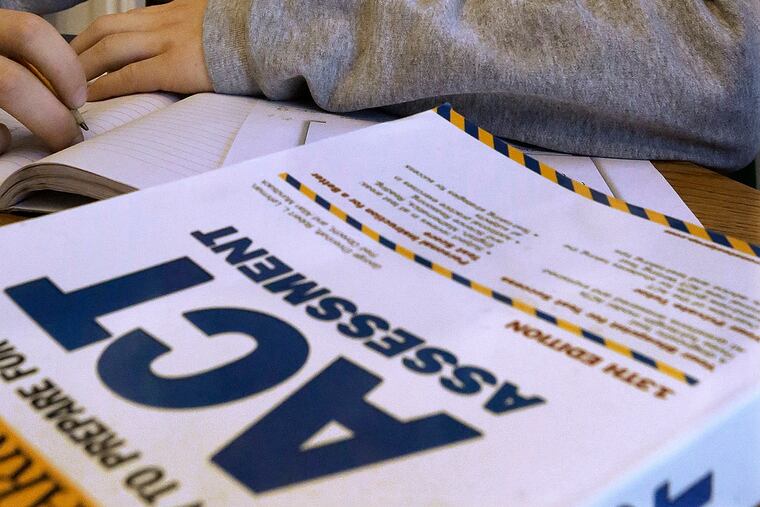I took the ACT during the pandemic. We didn’t have to wear masks.
The organizers at ACT have released lengthy guidelines for how they will keep students safe from contracting or spreading the coronavirus. But there’s a problem: Centers may not be following them.

People across the state, and country, are trying to figure out how to keep students and teachers safe. But when it comes to college admissions tests, a lot of students can’t wait, especially if they want to apply for early admission. And I’m one of them.
The organizers at ACT, the nonprofit of the same name that runs the test, have released lengthy guidelines for how they will keep students safe from contracting or spreading the coronavirus. But there’s a problem: Centers might not be following them.
“They are putting kids’ lives at risk,” said Bob Schaeffer, the interim executive director at Fair Test. “The pandemic is not their fault. The poor way in which they reacted to it is definitely their fault.”
Here’s what I saw, and experienced, taking the ACT in July:
Finding a test
Trying to find a place to take the ACT during the pandemic was stressful. My test date in June had been canceled, and when I tried to reschedule, the only dates I could get were too close to the college admissions deadlines. I had no choice but to take the ACT outside of Philadelphia.
Though many students have been rushing to take the test, colleges seem to be quickly adapting their admissions process, and many have said they won’t require test scores.
“The vast majority of schools in the country now, like 60%, including UPenn, and all the liberal arts colleges around Philadelphia, are test optional, at least till next year, for the Class of 2021 and many permanently so,” said Schaeffer.
But some students, including me, still think the test will hold weight on the college admissions process, and don’t want to miss any opportunity to get into the college of our choice. Also, test scores are still seen as important for getting scholarships.
Getting to the test
When I arrived at Delaware County Christian School on the day of the test, there was a long line of students outside, all spaced six feet apart. Many were wearing face masks and gloves and carrying calculators and pencils in Ziploc bags. When I got to the front of the line, a woman took my testing ticket, and told me my room number.
Not everyone who tried to take the test that day got that far. When I signed up to take the ACT, I was told surprise cancellations could happen up to the date of my test. This had already happened to me twice, and it happened to many students who tried to take the test in July, too.
“Some [sites] suddenly canceled at the last minute, leaving thousands of kids who had registration tickets, and were told their centers were open, who showed up at 8 a.m., to find a sign on the door saying the center had closed,” said Schaeffer.
Taking the test
My room was a normal classroom, which would usually hold about 25 students. Pennsylvania currently allows indoor gatherings of up to 25 people. But the 16 desks in this room were spaced about three or four feet apart, not six, which is required by the ACT guidelines, and recommended by the Centers for Disease Control and Prevention. (The test site coordinator refutes this point, and maintains that students were six feet apart.)
The instructor asked a series of screening questions, such as if we had been in contact with a person with symptoms, or if we had traveled to high-risk locations in the last two weeks.
I learned that a number of students were from different states. In my testing room, more than half of the students were from somewhere else. I met students from New York City and New Jersey who were staying at a nearby hotel.
Right before we started the test, the instructor said we could take our masks off while taking the test. I kept mine on, but I was the only one: All of my peers in the classroom took their masks off for the duration of the test. At the end of the test, we were simply dismissed, and could walk out of the building as we pleased, mask or not.
In an email ACT said, “It is recommended that students wear masks” while testing, while only the testing center staff are required to wear masks. ACT said that test centers are required to “abide by the COVID-19-related policies.”
Schaeffer says he has heard about these inconsistencies happening elsewhere, too.
“They didn’t have to open test centers at all,” says Schaeffer. “They could have required test centers to adhere to the safest practices possible, and they consciously have not done so. The answer you got is what everyone else gets: ‘We recommend them for test takers.’ That is not sufficient.”
Is it safe?
The organization said that it “expects these requirements to carry on into the fall test dates” and that it would adapt the policies as CDC recommendations change.
But online testing won’t happen soon.
“After the pandemic began, both ACT and SAT said that they would create computerized tests, and both of them have said they can’t do it this year. So both of them have postponed it until next year,” said Schaeffer.
As for me, I will keep studying for my next ACT, and possibly take it again this fall, with my mask on. Hopefully, things will be safer.
Timothy L. James is a senior at G.W. Carver High School of Engineering and Science working at The Inquirer this summer.